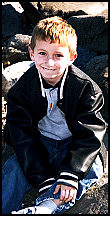 |
 |
4 OUT OF 4 STARS! -- The Daily News
About
a Boy - & 9/11
"Telling Nicholas," which
has its premiere this weekend, explores the aftershocks of the
World Trade Center tragedy by focusing ã literally and figuratively
ã on a single photo and following that lead.
The 90-minute documentary, by James Ronald Whitney, is a remarkable
piece of filmmaking. It's also a staggering piece of detective
work, an impressive piece of social work, and a story so amazingly
unpredictable and unabashedly human that it's all but guaranteed
to move, surprise, gratify and linger with everyone who sees
it.
In addition to its TV unveiling as a Mother's Day "America Undercover"
installment, "Telling Nicholas" is one of several films
about Sept. 11 that will be shown at the Tribeca Film Festival,
which runs today through Sunday. Its place on the program, though,
is anything but parochial. To date, "Telling Nicholas"
is the most emotional film, and the best, to emerge from the
ashes of the terrorist tragedy - and that includes CBS' highly
regarded "9/11," which aired in March.

Getting Personal: Nicholas Lanza, of 'Telling Nicholas' |
Whitney, who lived just a few blocks from the World
Trade Center, trained his camera on the towers shortly
after the first plane hit. All the footage from the
documentary showing the towers burning or collapsing
was shot by Whitney himself, including the encroaching
dust cloud that drove him from his home and immediate
neighborhood.
For many filmmakers, that would be enough; for Whitney,
it was only the starting point. The next day, as he
looked for (and, unfortunately, found) familiar faces
among the missing-persons flyers posted on the sealed-off
area's perimeter, one photo in particular caught Whitney's
eye. It was a picture of Staten Islander Michele Lanza,
36, and her 7-year-old son, Nicholas. The mother was
missing, and her family in Tottenville was seeking information
about her fate or whereabouts. |
At that point, every photo on that wall, and on every other
wall like it, had a story to tell. What Whitney did that was
so rare, and so rewarding from a filmmaking sense, was to follow
that photo, and that thread, wherever it went.
He ended up finding a little boy who had yet to be told about
the disaster, and who would be sheltered from it for many days
afterward. The title of the movie suggests its central story
line, but this documentary contains much more.
Whitney is part archeologist, using everything he can unearth
- family films and photos, answering-machine messages, postcards
on an abandoned desk - to bring his subjects and their stories
and emotions to life.
Some of the ironies and artifacts are uncanny, but what's most
unbelievable is the intimacy of this real-time look at a grieving,
coping, sometimes fractured family.
To detail what happens would be to rob this true-life tale,
which no screenwriter could have written, of some of its potency.
There's no overarching happy ending here, but there are plenty
of scenes to be witnessed, and lessons learned about love, loss
and resiliency.
"Telling Nicholas" is a documentary with a heart, and
a heartbeat, that I doubt I'll ever forget.
|
|
|
|



